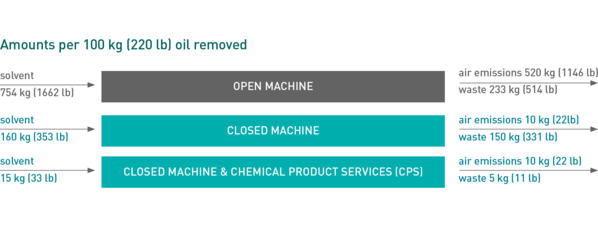
What are modified alcohols and can they be a viable solution for you?
Modified alcohol solvents have already been on the market for over two decades. Although they are less known compared to traditional halogenated solvents, such as perchloroethylene, trichloroethylene or methylene chloride, modified alcohols are no less effective in meeting the most discerning cleaning requirements.
Often modified alcohols are deployed in industries with the most critical safety and quality requirements, from aerospace and automotive to medical technology and electronics.
What are the properties of modified alcohols?
Produced synthetically, modified alcohols are remarkably stable (temperature and pH). Because of their polar and non-polar properties, modified alcohols can effectively clean off non-polar contaminants such as oils and greases, just as effectively as certain polar contaminations like cooling emulsions or solids such as particles and abrasives.
Modified alcohols have universal compatibility with metals and very good drying properties. Due to their low surface tension, they can wet into and evaporate out of blind holes or crevices easily, making them a highly effective cleaning agent for tiny or complex component parts. Compared to traditional non-polar solvents, modified alcohols offer a distinct advantage in cleaning off a wider range of contaminants and therefore have a much broader application range.
Particularly in the aerospace sector, with modified alcohol being a non-halogenated solvent, there are no risks associated with hydrogen embrittlement of titanium or aluminium. This is a huge advantage considering that the only option in the past to avoid this was to adopt water-based systems.
Modified alcohols used in combination with closed vacuum cleaning machines
Contrary to halogenated solvents, modified alcohols do have a flash point – so they must be applied in closed vacuum cleaning machines, or the so-called airtight/airless degreasers. The initial capital expenditure might be seen as a hurdle by manufacturers. However, bearing in mind the much higher cost efficiency such machines can enable, this is a worthwhile investment that pays for itself in relative short time periods.
Closed vacuum cleaning machine/airless degreaser can significantly reduce solvent consumption and environmental impact
Consider a scenario where 100 kg of oil needs to be removed – the deployment of an airtight degreaser can dramatically reduce, in the example below, the solvent consumption of Perchloroethylene by almost 5 times, from 1662 Ib to 353 Ib compared to an open machine. With the support of Chemical Product Services (CPS), such as consistent solvent monitoring and stabilization, the amount of solvent required can drop even further from 353 Ib to a mere 33 Ib.
Similar reductions are also possible with modified alcohols.

More importantly, safety standard and environmental protection are heighted at the same time. Operators have virtually no contact with the chemical, air emissions are kept to a minimum and waste volumes are being optimized.
Through the distillation unit equipped in the closed cleaning machine, used solvent can be continuously distilled and purified. Because of their narrow boiling range, modified alcohols can be more easily distilled and separated from contaminants, and hence more effectively recovered during the distillation process.

The reuse of the solvent over multiple cleaning cycles significantly reduces solvent consumption and waste while lowering overall cleaning costs. Through continuous monitoring of the solvent condition and addition of stabilizers, solvent lifespan can be extended still further. When comparing this to an aqueous based system, the environmental impact can be significantly reduced due to no additional energy required for drying components, and no water needed for cleaning, making solvent cleaning much more resource friendly.

Are modified alcohols right for your application?
Modified alcohols are particularly suitable for use where high standards of cleanliness are demanded, or where a high material throughput is important. Particularly for subsequent processes that demand high surface tension of the metal surface, such as hardening, coating, machining, or non-destructive testing (NDT), the recycling of used solvent in built-in distillation enables a constant supply of reliably clean solvent to achieve required technical cleanliness.
Choosing the right cleaning solution always depends on the specific context. When assessing the suitability of modified alcohols for your applications, consider the following:
-
What contaminations are you trying to remove (e.g. polar or non-polar)? What are their quantities?
-
Are you cleaning different metal types (e.g. iron, brass, copper, aluminum, titanium)?
-
Do your metal parts have complex geometries (e.g. blind holes)?
-
What are your cleaning requirements? Do you have to achieve precision cleaning where an exacting technical cleanliness must be fulfilled?
If you have massive parts, cleaning machines can also be specifically designed to accommodate the required size and throughput of what you are manufacturing.
Apart from such technical considerations, economic factors must be carefully considered. In addition to the acquisition cost of the machine, the true cost of your metal cleaning process should take into account:
-
Cleaning chemistry
-
Waste disposal costs
-
Energy consumption
-
Space requirements
-
Cycle times and throughout
-
Potential for recycling cleaning agent
-
Labor costs for ensuring process stability
The use of modified alcohols in closed vacuum cleaning machines gives an exemplary example of how risks are properly managed, employee welfare and safety is looked after, and sustainability and regulatory compliance are well demonstrated.





